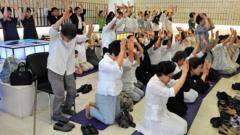The Tokyo district court ruling mandates the dissolution of the Unification Church, which began operations in Japan during the 1960s, after intense scrutiny following the shocking assassination of Shinzo Abe in 2022. The alleged assassin claimed his actions were fueled by grievances against Abe's affiliations with the church, which he accused of financially ruining his family.
Japan's Ministry of Education and Culture spearheaded the legal measures against the church, alleging it manipulated followers into making undue donations. The court's ruling strips the church of its tax-exempt status and obliges it to liquidate assets, though it maintains the ability to operate within the country.
Investigating the church, authorities spoke to nearly 200 individuals who alleged coercion and financial exploitation related to expensive purchases and the threat to their spiritual well-being. Traditionally, the Unification Church promotes the idea that marriage is essential for spiritual salvation, famously organizing mass wedding ceremonies that unite thousands of couples.
In light of growing inquiries post-Abe's assassination, about 200 former church members have demanded a total of 5.7 billion yen (approximately $38.5 million) in compensation. The fallout also led to revelations of deep connections between the church and Japan’s ruling Liberal Democratic Party (LDP), resulting in resignations of four ministers and exposing over half of the party's lawmakers as having interactions with the church.
This situation unveils an alarming web of influence, with many shocked by the extent of the church's ties to political figures, sparking a nationwide conversation about religious practices and public accountability in Japan.
Japan's Ministry of Education and Culture spearheaded the legal measures against the church, alleging it manipulated followers into making undue donations. The court's ruling strips the church of its tax-exempt status and obliges it to liquidate assets, though it maintains the ability to operate within the country.
Investigating the church, authorities spoke to nearly 200 individuals who alleged coercion and financial exploitation related to expensive purchases and the threat to their spiritual well-being. Traditionally, the Unification Church promotes the idea that marriage is essential for spiritual salvation, famously organizing mass wedding ceremonies that unite thousands of couples.
In light of growing inquiries post-Abe's assassination, about 200 former church members have demanded a total of 5.7 billion yen (approximately $38.5 million) in compensation. The fallout also led to revelations of deep connections between the church and Japan’s ruling Liberal Democratic Party (LDP), resulting in resignations of four ministers and exposing over half of the party's lawmakers as having interactions with the church.
This situation unveils an alarming web of influence, with many shocked by the extent of the church's ties to political figures, sparking a nationwide conversation about religious practices and public accountability in Japan.





















